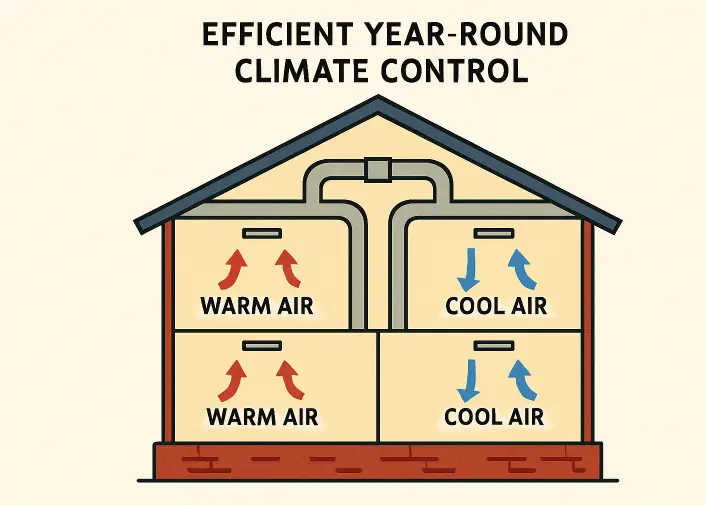What Is a Central HVAC System?
A central HVAC system, which stands for heating, ventilation, and air conditioning, is designed to deliver comfort throughout an entire home or commercial property by moving heated or cooled air through a network of ducts. This approach ensures that every room receives the right amount of conditioned air for consistent performance all year. Unlike window units or space heaters, central systems offer greater efficiency, reliability, and long-term value. Increasingly, many property owners are turning to advanced solutions like central ducted heat pumps to balance energy use and achieve optimal indoor climate control. Central HVAC systems let users fine-tune temperature, humidity, and air quality from a single thermostat or smart device. Centralized models can provide up to 30% more efficiency compared to outdated, piecemeal units. Modern central ducted heat pumps in particular are gaining a reputation for their versatility and energy-saving features, making them a leading solution for new construction and retrofits alike.
Why Central HVAC Matters for Homes and Businesses
Efficient temperature control is not just about staying comfortable—it supports productivity, well-being, and even long-term health. In work environments, studies show that stable indoor temperatures can improve cognitive functioning and limit absenteeism. Homes with central HVAC enjoy year-round comfort with less worry about seasonal extremes or humidity spikes. High-quality systems also help preserve building materials and furnishings by minimizing moisture and airborne pollutants, which is crucial for both residential and commercial spaces. The benefits of central HVAC go beyond comfort and health. They also can have an economic impact. A well-maintained system preserves property value, lowers utility costs, and reduces the risk of expensive emergency repairs or equipment failure. For families and business owners alike, investing in the right HVAC system is an investment in peace of mind.
Key Features to Consider in Modern HVAC Units
When selecting a new central HVAC system, focusing on certain features can make a substantial difference in performance, efficiency, and long-term savings:
- Variable speed motors enable smoother and quieter operation, adjusting airflow to meet real-time needs.
- Smart thermostats remember your routines and respond to occupancy, weather, and energy pricing for maximum savings.
- Multi-stage compressors run at lower power levels most of the time, reserving high output for only the hottest or coldest days.
- Advanced filtration options capture more dust, pollen, and airborne particles, improving air quality for everyone indoors.
Prioritizing these features makes it easier to find a system that complements both your comfort and sustainability goals.
Energy Efficiency: Saving Money and the Environment
Upgrading to a high-efficiency central HVAC system is one of the most significant steps you can take to cut energy use at home or in the workplace. The latest ENERGY STAR certified HVAC products typically use 15-20% less energy than standard models. In addition to reducing electricity bills, they also help lower your carbon footprint. Some newer units utilize variable-speed technology and eco-friendly refrigerants that decrease greenhouse gas emissions, supporting broader environmental goals.
Installation and Maintenance: What to Expect
Proper installation is critical to getting the best performance and efficiency from your HVAC system. Professional installers begin by evaluating your property’s square footage, insulation quality, and unique climate needs to recommend an appropriately sized unit. After the initial setup, regular maintenance—such as replacing filters, checking ductwork, and servicing moving parts—keeps the system running efficiently. Scheduling annual or semi-annual tune-ups can prevent costly breakdowns and extend the system’s overall lifespan. Routine professional maintenance can increase HVAC system longevity by several years while ensuring you enjoy consistent comfort without unwelcome surprises.
The Benefits of Better Indoor Air Quality
Modern central HVAC units do more than adjust temperatures—they actively filter the air, helping to reduce allergens, dust, and harmful particles. Enhanced filtration and smart sensors can capture up to 95% of airborne contaminants, according to leading health organizations. This makes a substantial difference for households with allergy sufferers, asthma patients, or those concerned about respiratory health. Many new systems can even monitor and report on indoor air quality, prompting timely maintenance or filter replacement.
When selecting a central HVAC system, it’s crucial to consider not only the efficiency and size but also the specific needs of your home. A well-chosen system can provide consistent comfort throughout the year, adapting to seasonal changes with ease. For those looking to delve deeper into the intricacies of air conditioning systems and their benefits, you can explore more to find detailed insights and professional guidance. This ensures that your investment not only meets your immediate needs but also offers long-term reliability and energy savings.
Costs, Incentives, and Rebates for New HVAC Systems
Investing in a central HVAC system requires careful consideration of upfront expenses, but significant savings are available through various incentives. The total installed cost can differ based on system complexity, local rates, and chosen features, but many utility providers and government agencies offer tax credits and rebates for energy-efficient installations. Homeowners can expect to recover 10-20% of their initial investment through these programs. To maximize your savings, consult local professionals who can identify additional regional and federal rebates as well as help with proper paperwork and eligibility requirements.
The Future of Central HVAC: Smart Technology Trends
The central HVAC industry is undergoing rapid transformation as smart technology enters the mainstream. New systems now integrate with mobile devices and smart home hubs, allowing users to control their environment remotely or by voice. Modern innovations include adaptive learning algorithms, more responsive zoning controls, and eco-friendly refrigerant options with lower global warming potential. As these advancements continue, future HVAC systems promise even greater efficiency, adaptability, and user-friendly control, ensuring that your comfort keeps up with tomorrow’s technology.
Conclusion
Central HVAC systems remain one of the most reliable and efficient solutions for maintaining year-round indoor comfort. Beyond regulating temperature, they enhance air quality, protect property, and contribute to healthier living and working environments. While the upfront investment can be significant, long-term energy savings, available rebates, and improved property value make them a sound financial decision. With the rise of innovative technology and eco-friendly innovations, today’s systems are more intelligent, cleaner, and adaptable than ever. Whether for a home or a business, upgrading to a modern central HVAC system is not just about comfort but efficiency, sustainability, and future-ready living.
Also Read-
- Smart Tips for Budget-Friendly Home Improvement Projects
- Business Hospitality
- Why Tech-Savvy Designers Are Turning to Virtual Tools for Better Results








